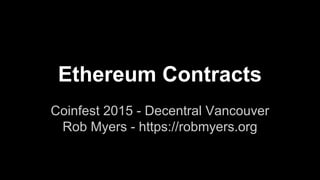
Ethereum Contracts - Coinfest 2015
- 1. Ethereum Contracts Coinfest 2015 - Decentral Vancouver Rob Myers - https://robmyers.org
- 2. ÐApps Distributed Applications ● Ethereum - Smart contracts ● Whisper - Ephemeral communication ● Swarm - DHT storage
- 3. How Will We Use ÐApps?
- 4. How Will We Develop ÐApps?
- 5. What Is A Contract? ● A small piece of code. ● A self-contained piece of code. ● A small amount of data. ● A public body of data. ● A small amount of Ether.
- 6. If You Know MVC...
- 7. What Is A Transaction? ● How we communicate with contracts. ● Data and Ether can be sent via transactions. ● Sent from the JS API or other contracts. ● Transactions cost "gas", the sender pays. ● JavaScript API can use accessors instead.
- 8. Writing Contracts ● Write contracts in the Solidity language. ● Create the UI for contracts in HTML/JS. ● AlethZero is a good place to start. ● solc / eth / Chrome is the cutting edge. ● Mix IDE & Mist browser are the future.
- 9. Bad Ideas For Contracts ● Doom on the EVM (too much processing). ● Video on the blockchain (too much storage). ● Ethereum web server (no network access). ● Blockchain DRM (blockchain is public). ● Anything that uses too much processor time, storage, or secrecy.
- 10. Good Ideas For Contracts ● Altcoins, tokens, assets. ● Crowdfunding, fan incentive schemes. ● Voting systems, prediction markets, lotteries. ● Access control - sites, games, doors, cars. ● DAOs - Organizations on the blockchain. ● Use your imagination! :-)
- 11. A Solidity Contract contract Coin { address minter; mapping (address => uint) balances; function Coin() { minter = msg.sender; } function mint(address owner, uint amount) { if (msg.sender != minter) return; balances[owner] += amount; } function send(address receiver, uint amount) { if (balances[msg.sender] < amount) return; balances[msg.sender] -= amount; balances[receiver] += amount;
- 12. Compiling The Contract $ solc --binary file --json-abi file Coin.sol
- 14. The Contract's ABI [ { "constant" : true, "inputs" : [ { "name" : "addr", "type" : "address" } ], "name" : "queryBalance", "outputs" : [ { "name" : "balance", "type" : "uint256”,
- 15. Call The Contract From JavaScript <script type="text/javascript" src="../ext/bignumber.min.js"></script> <script type="text/javascript" src="../ext/ethereum.js/dist/ethereum.js"></script> ... var web3 = require('web3'); web3.setProvider(new web3.providers.HttpSyncProvider('http://localhost:8545')); var contract_address = "0xaf1206fcb32fbdb42878c429e61a49d5143e6f32"; var contract_abi = ... // see previous slide var contract = web3.eth.contract(contract_address, contract_abi); ... var accountBalance = parseInt(contract.call().queryBalance(queryAddress)); contract.call().send("0xaf1206fcb32fbdb42878c429e61a49d5143e6f32", accountBalance / 100);
- 16. Try It Yourself Online compiler: https://chriseth.github.io/cpp-ethereum/ Example ÐApps: https://github.com/ethereum/dapp-bin
- 17. Where To Learn More The Wiki: https://github.com/ethereum/wiki/wiki The Forum: https://forum.ethereum.org/
- 18. Install Party! AlethZero / solc / eth / mix: https://github.com/ethereum/cpp-ethereum/wiki Mist: https://github.com/ethereum/go- ethereum/wiki/Building-Ethereum%28Go%29